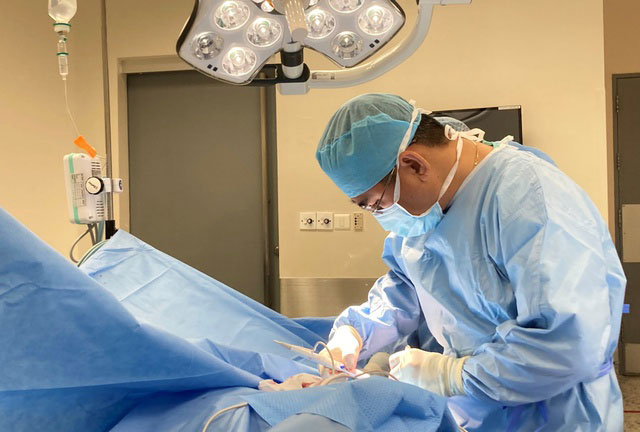In early June 2023, Mr M. (62 years old, from England) visited FV Hospital to receive treatment for a wound a consequence of an incident during a skin tightening procedure received at another cosmetic centre. Doctors from FV Lifestyle Clinic at FV Hospital stated that the surgical incision was severely infected, causing tissue necrosis which was at risk of spreading.
Infection and tissue necrosis caused by a facial skin tightening procedure at an unlicensed cosmetic centre
Mr M. stated that he decided to undergo facial skin tightening at the cosmetic centre based on a compelling consultation with the provider and what he thought was a “reasonable” price. However, after eight days, the surgical incision became swollen and started to discharge fluid. Concerned about his condition, Mr. M. visited FV Hospital for treatment.
During examination at FV Lifestyle Clinic, Dr Tran Anh Tan observed that the surgical incision made near Mr M.’s ear was infected and the tissue had become necrotic. Another point of concern was that the cosmetic centre which had performed the procedure had closed the incision using a stapler. Dr Tan explains that while staples allow for quick closure of the wound, they often result in less aesthetically pleasing outcomes and obvious scarring and are not commonly used in aesthetic surgery.

Dr Tan performs surgery at FV Hospital.
Dr Tan decided to perform surgery to properly treat infection in the patient, and spent four hours carefully removing extensive amounts of necrotic tissue before completing the operation. Mr M.’s skin was already taut from the facelift procedure, forcing Dr Tan to carefully navigate the wound closure to avoid the need for a complex skin graft surgery in the future.
“Ensuring there is no secondary infection and providing proper wound care to minimise scarring is another important consideration,” says Dr Tan. Fortunately, the surgery was performed in a meticulously controlled, sterile operating room with the highest level of precision from FV’s expert medical team. As a result, Mr M’s wound healed successfully, and he was discharged from the hospital on June 18th.
Treating aesthetic accidents is extremely complex and challenging
Mr M. is one of many patients who have experienced aesthetic accidents at unregistered beauty centres and later sought help at FV Hospital to “remedy the aftermath.” On June 24th, a woman in her fifties arrived at FV Hospital’s emergency department with a complication of pus leakage in her breasts caused by the placement of saline breast implants. Dr Nguyen Thanh Vinh, FV Lifestyle Clinic, performed surgery on the patient, extracting over 300ml of pus and removing the infected breast implants from her body. Without timely treatment, the patient could have faced fatal consequences.

Injecting Liquid Silicone Fillers Causes Numerous Dangerous Complications
Common cosmetic surgery complications include:
- Eyelid surgery: excessive skin tightening preventing proper eye closure even during sleep, leading to dry eyes
- Rhinoplasty: infections causing nasal tissue necrosis, deviated or crooked nose, blood pooling
- Breast augmentation surgery: infections, capsule contracture, haematoma, implant rupture
- Tummy tuck surgery: infection, skin necrosis, excessive bleeding and pooling, uneven abdominal contours.
Rhinoplasty complications can result in scar contracture, narrowing the nostrils and making it difficult for patients to breathe. Through abdominal liposuction and contouring, FV Hospital has treated patients with complications such as excessively stretched skin and inadequate blood supply to the wound area, leading to skin necrosis. Managing cases of skin necrosis to avoid further tissue loss is very challenging and requires meticulous surgical debridement followed by careful wound care.
Recently, complications from filler injections for breast, buttocks, cheeks, and eyes have become more prevalent. FV doctors have discovered that the substance injected into patients causing adverse reactions is liquid silicone, which is banned by the FDA (US Food and Drug Administration).
Removing liquid silicone from the body is extremely complex. Removing liquid silicone injected into the breasts may require a partial or complete mastectomy. Even after such procedures, there may still be residual silicone in the body, posing risks of inflammatory reactions, aesthetic loss, fibrosis, and the need for multiple surgeries, explains Dr Nguyen Thanh Vinh.
Filler injections can also pose health risks such as arterial occlusion, leading to blindness. Severe complications include pulmonary embolism, cerebral vascular occlusion resulting in hemiplegia, limb weakness, and even death.
“Long-term consequences of silicone complications place significant pressure on surgeons. Only experienced practitioners can develop treatment plans and accurately predict treatment outcomes to adequately counsel patients,” shares Dr Vinh.
The most challenging aspect is stabilising the patient’s psychological state.
One of the most challenging aspects for doctors treating cosmetic surgery complications is managing the patient’s psychological state. Patients typically have a strong desire to address the complications and improve their appearance simultaneously, which often is not feasible. “FV Hospital has a medical protocol that prioritises the patient’s health and safety. It is only after a six-month recovery period from surgery to correct complications that aesthetic procedures can be considered. Doctors bear a responsibility to explain this to patients,” adds Dr Vinh.

Dr Vinh believes cosmetic surgeon must know when and how to decline to perform procedures for would-be clients
Many patients come to FV for treatment of complications after plastic surgery and then rush to undergo more cosmetic procedures elsewhere, later returning to see Dr Vinh again because they are unsatisfied with the results.
“Being a cosmetic surgeon is not simple: to create a simple and effective treatment protocol requires a process of learning and skill development. Importantly, the doctor must not lose their agency and must know how to decline to perform procedures for clients when faced with beauty requests that pose risks to the patient’s health,” emphasises Dr Vinh.

